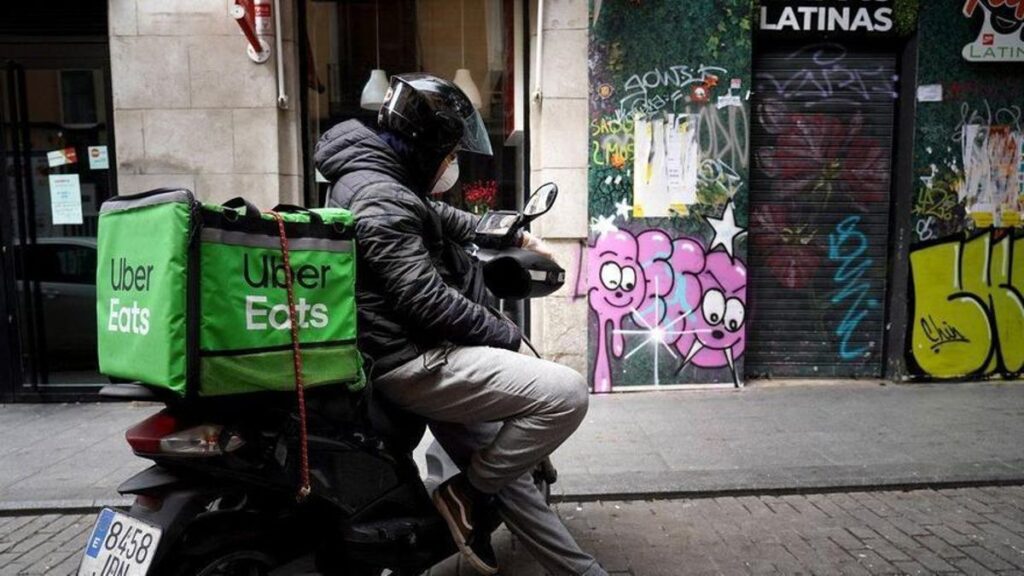
“Uber “He's not going to kid us,” was the promise that the second vice president made this past Thursday, Yolanda Diazin the presentation of the new strategic plan of the Labor Inspection. The leader of Sumar advanced an offensive by labor authority agents on the fleets of the food delivery application to verify whether or not their delivery drivers operate as false self-employed.
An offensive in which more troops from the Inspection will now be able to invest, but which does not start from scratch. And the labor police have been monitoring Uber's fleets for some time and imposing million-dollar penalties on the multinational, although the corporation, for the moment, is avoiding paying them.
Uber is the second most important company in the delivery sector in Spain. Glov is the first, with a share of the Spanish market of 53.8%, compared to 14.5% of Just Eat and 28.5% of Uber Eats, according to information provided in a recent trial between the first two companies.
23.2 million in minutes
According to data compiled by EL PERIÓDICO based on the Inspection minutes appealed by Uber in court, the corporation has been sanctioned with at least 23.2 million eurosbetween unpaid Social Security contributions and infractions.
However, the criterion that to date has been imposed in the National Courtas far as an important part of those minutes challenged by Uber have gone, is that the company does employ false self-employed workers, at least until before the entry into force of the 'Rider law', but that it should not be fined for it.
A criterion that substantially reduces the bill for the multinational, since of those at least 23.2 million euros mentioned in different minutes collected in dozens of sentences examined by this means, 19.75 million are the result of sanctions and the rest in due contributions. That is, of the 23.2 million euros imposed in minutes drawn up in Valencia, Sevilla, Albacete, Tenerife o Sevillaamong others, for now Uber will only have to pay 3.46 million.
Without 'fraud'
Why are the courts recognizing that Uber riders were false self-employed workers but exempting them from sanctions? “The violation assessed for lack of contribution takes as its starting point a legally controversial issue at that time,” argue the judges of the National Court, which eliminates the “fault” or fraud sought. That is, the inspectors, in the judicial opinion, acted with excessive forcefulness and haste when sanctioning Uber.
Which does not invalidate the fact that, if the labor police reach the same conclusions during this new offensive announced by Díaz, they can now sanction these same practices with million-dollar amounts. Well, in the recurrence, a key element in the investigations against Glovo, they can justify this fraud.
The sanction that Uber has not escaped is due to obstruct inspection in his actions in Burgos, where he did not provide information about the hours his delivery workers worked, according to one of the sentences analyzed by this medium.
Sector in motion
The pace of the Inspection is slow and the amount of information to be analyzed is enormous, as has been evidenced in the actions against Glovo. Until January 2024, as EL PERIÓDICO advanced, the first sanction for violating the 'Rider law' was not imposed. A law that came into force in August 2021. If similar deadlines are imposed on Uber's actions, it may take months, if not years, for the first infringement sanctions on the green backpack company to be ratified.
Currently, Uber operates with mixed fleets, in which a portion of salaried delivery drivers, hired by companies associated with Uber, and autonomous 'riders' participate, with “full autonomy, including the possibility of setting their own rates or accepting and rejecting orders whenever they wish,” according to what the company defends.
A model, due to this second leg, that “presumably is outside the law,” in the words of the second vice president. AND “In Spain the laws are followed“, as he emphasized last Thursday.
Subscribe to continue reading